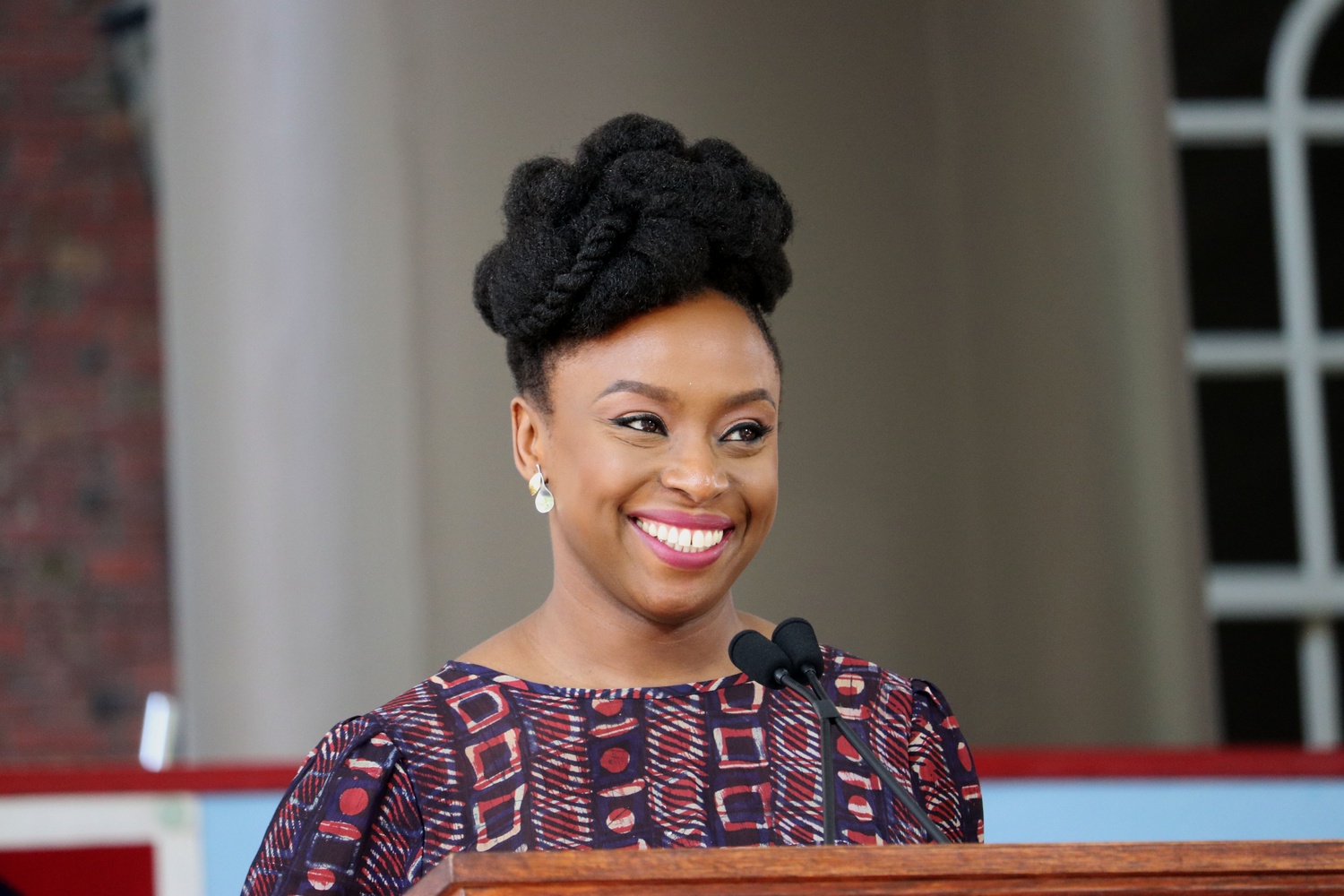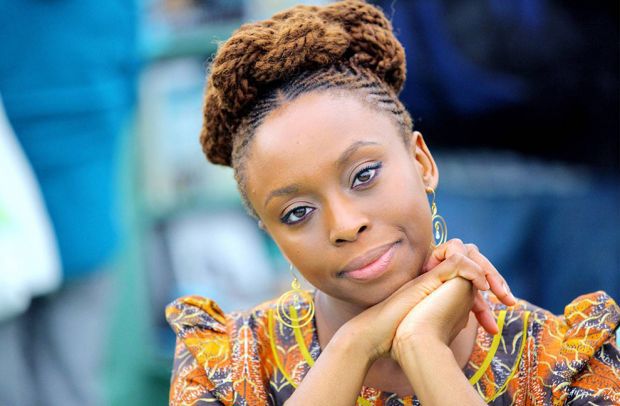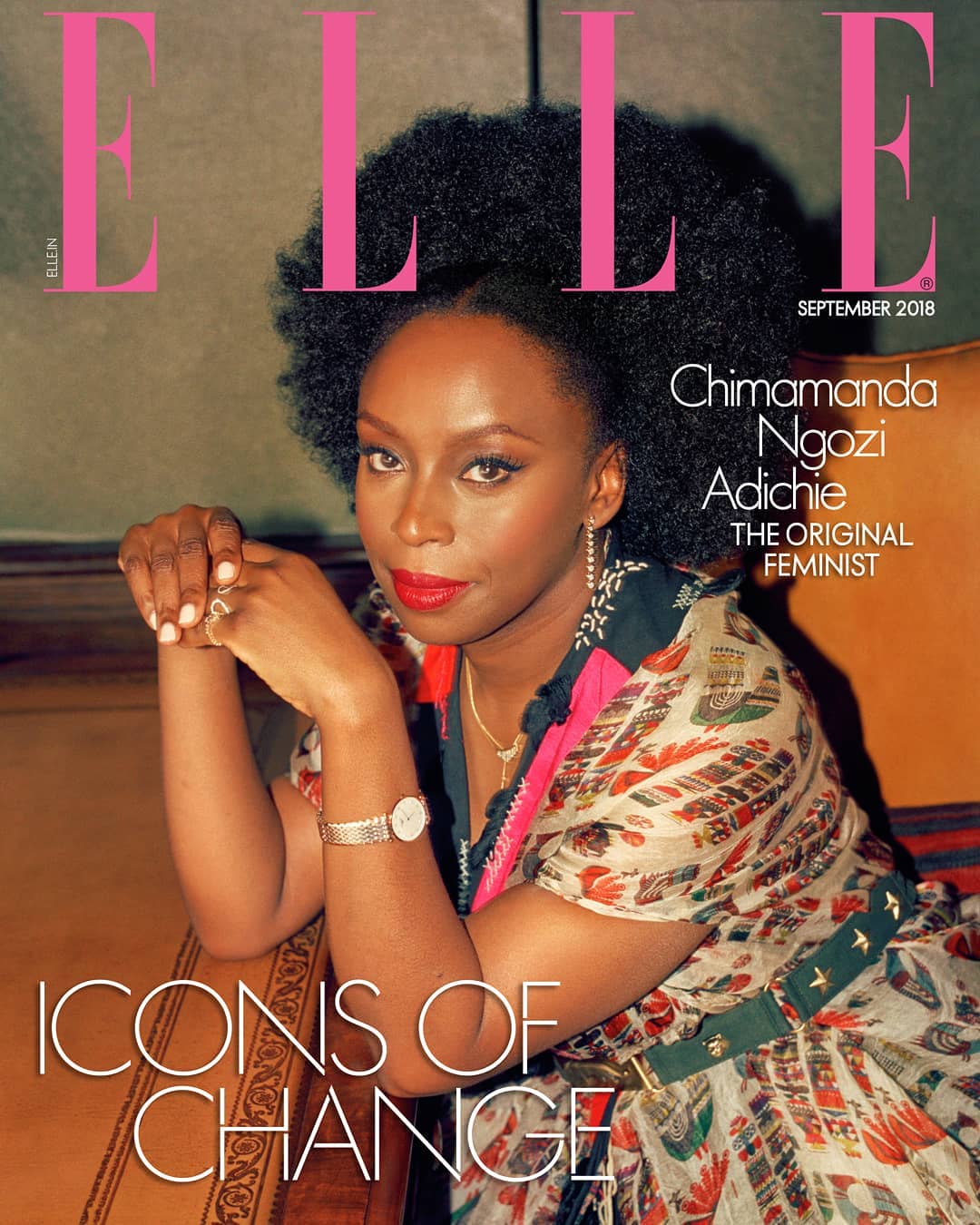ARTS & CULTURE
Chimamanda Adichie’s ‘Americanah’ listed among 21st century books by women
Published
7 years agoon
By
FAB
Chimamanda Adichie’s novel, Americanah, has been recognised as one of 15 remarkable books by women that are shaping the way fiction was being written and read in the 21st century.
The book was listed by the New York Times Staff Book Critics among fiction books, each of which features a woman at its center, to mark Women’s History Month.
According to The New York Times, on their selection process, the 15 books were fictional novels that addressed diverse issues.

The international news magazine wrote on its website ‘nytimes.com’ that the list of fiction books was compiled to mark Women’s History Month, tagging the women ‘The New Vanguard’.
The list aims “to think about these writers who are opening new realms to us, whose books suggest and embody unexplored possibilities in form, feeling and knowledge.”
For Adichie’s citation, the magazine wrote, “If you were paying attention, you might have seen this book coming.
“Chimamanda Ngozi Adichie’s first novel, “Purple Hibiscus,” was long listed for the Man Booker Prize.
“Her second, “Half of a Yellow Sun,” won the Orange Prize. In 2008, she was awarded a MacArthur “genius” grant.
“But “Americanah” more than paid off on this writer’s promise. It’s a resonant and fiercely intellectual novel about a Nigerian woman named Ifemelu who leaves Africa for America and suffers here.
“Before starting a blog called “Raceteenth or Various Observations About American Blacks (Those Formerly Known as Negroes) by a Non-American Black” and winning a fellowship at Princeton.
“Adichie works both high and low; she’s as adept at dissecting internet and hair salon culture as she is at parsing the overlapping and ever-changing meanings of class and race in the United States.
“Americanah” brings news, on many fronts, about how a new generation of immigrants is making its way in the world. It has lessons for every human about how to live,” The New York Times wrote.
NAN reports that ‘Americanah’ is a 2013 novel, for which Adichie won the 2013 National Book Critics Circle Fiction award.
It traces Ifemelu’s life in both countries, threaded by her love story with high school classmate, Obinze.
In 2013, the book was selected as one of the 10 Best Books of the year by the editors of the New York Times Book Review.
It was shortlisted for the 2014 Baileys Women’s Prize for Fiction of the United Kingdom.
The Chicago Tribune awarded Adichie its 2013 Heartland Award for Fiction, recognising Americanah as a novel that engages with important ideas about race, and does so with style, wit and insight.
In March 2017, Americanah was picked as the winner for the “One Book, One New York” program, part of a community reading initiative encouraging all city residents to read the same book.
Adichie had been featured severally in the New York Times, including being a part of the magazine’s ‘Greats’ List in 2017.
In 2017, ‘Americanah’ won the ‘One Book, One New York’ campaign by the Mayor’s Office of Media and Entertainment and BuzzFeed.
The Women’s History Month is an annual declared month that highlights the contributions of women to events in history and contemporary society.
It is celebrated in March in the United States, the United Kingdom, Australia and other parts of the world, corresponding with International Women’s Day on March 8.
You may like
-


Chimamanda Adichie Introduces “Mama’s Sleeping Scarf” At Alliance Française Lagos
-


5 Women Who Have Taken Nigerian Fashion To The World
-


“To Live In Lagos Is To Live On Distrust. You Assume You Will Be Cheated” Chimamanda Adichie Writes About Living In Lagos
-


I think Chimamanda Ngozi Adichie “is an extremist… misleading a lot of our girls” – Eunice Atuejide
-


”The commercialization of bride price during weddings is quite disgusting” Chimamanda Adichie
-


Chimamanda Ngozi Adichie Talks Scandalous Cooking Habits, Storytelling Spirits As She Covers Elle India’s September Digital
ARTS & CULTURE
Ijele Masquerade: The “King Of Masquerades” In Igbo Land
Published
4 months agoon
December 21, 2024By
wpadminee
The Ijele Masquerade, often referred to as the “King of Masquerades,” holds a revered position in Igbo culture. It is not only the largest masquerade in Africa but also a symbol of unity, spirituality, and cultural identity among the Igbo people.
Its towering presence, vibrant artistry, and profound symbolism make it a centrepiece of Igbo traditions.
The Ijele Masquerade originated in southeastern Nigeria, particularly in Anambra and Enugu states. Oral traditions trace their roots to the Akwunechenyi dance group in Umueri.
It began as a celebratory and protective figure, initially created to intimidate invaders and celebrate royalty. Over time, it evolved into a cultural icon representing greatness and the Igbo people’s connection to their ancestors.
Standing between 12 and 15 feet tall, the Ijele Masquerade is a marvel of craftsmanship. It is constructed from bamboo, colourful fabrics, and intricate carvings.
Its structure is divided into two segments: the upper (Mkpu Ijele) and the lower part (Akpakwuru Ijele), separated by a symbolic python figure, Eke-Ogba.
This design signifies the balance between the spiritual and earthly realms. The preparation of the masquerade requires extensive collaboration, with over 100 men working for six months to complete its elaborate design.
Cultural and Spiritual Significance of Ijele Masquerade
The Ijele Masquerade embodies the collective spirit of the Igbo community. It is a representation of the ancestors’ guidance, protection, and blessings.
Traditionally performed during festivals, burials, and special ceremonies, the Ijele is believed to have spiritual powers, such as warding off evil spirits, promoting fertility, and bringing healing.
Its performance is both a spectacle of entertainment and a deeply spiritual ritual that connects the living to their heritage.
The Ijele Masquerade is a highlight of Igbo cultural festivals, often serving as the grand finale. Accompanied by music, drumming, and traditional dances, its performance captivates audiences with its grandeur and artistry.
These events also serve as a platform for preserving and promoting Igbo heritage, attracting tourists, and generating economic benefits for the community.
Challenges Facing Ijele Masquerade
Despite its cultural significance, the Ijele Masquerade faces challenges in the modern era. Urbanisation, globalisation, and declining interest among younger generations threaten its preservation.
The elaborate nature of its preparation also requires significant funding and resources, which are often scarce. Additionally, cultural appropriation by outsiders risks diluting its authenticity and significance.
Efforts to preserve the Ijele Masquerade have gained international recognition. In 2009, UNESCO listed it as an intangible cultural heritage in need of safeguarding.
This recognition highlights the importance of supporting local communities to maintain their traditions. Advocacy for funding, education, and tourism initiatives is vital to ensuring the continuity of this cultural treasure.
A Symbol of Igbo Identity
The Ijele Masquerade remains a powerful symbol of Igbo identity and resilience. It is a testament to the creativity, spirituality, and unity of the Igbo people.
As it continues to inspire pride and admiration, the Ijele Masquerade underscores the importance of preserving cultural heritage in a rapidly changing world.
By supporting initiatives that promote Ijele, individuals and organisations can help sustain this remarkable tradition for future generations.
Its legacy is not only a source of pride for the Igbo people but also a significant contribution to the global appreciation of cultural diversity.
For further details about the Ijele Masquerade, see sources like UNESCO’s Intangible Cultural Heritage listing and articles exploring its cultural significance.
Read more on culture here.
ARTS & CULTURE
Does Anklet Really Signify Promiscuity?
Published
4 months agoon
December 7, 2024By
wpadminee
What is an anklet?
An anklet is a versatile piece of jewellery that women typically wear around their ankles. Crafted from materials like chains, beads, or a mix of both, anklet meanings vary across cultures and styles.
Many fashionable women choose anklets to make a bold style statement, embracing their elegance and charm.
In Nigeria, people often call this accessory a “leg chain” or “ankle chain,” reflecting its cultural relevance. In pop culture, it’s popularly known as an “ankle bracelet.”
Anklets here focus more on fashion than symbolism, though interpretations can differ. With various styles and intricate designs available, anklets offer countless aesthetic options, allowing women to showcase their personal flair.
Ultimately, anklet meanings can be deeply personal, influenced by tradition, culture, or simply individual taste.
Cultural and Historical Significance
Throughout history, anklets have held different meanings across various cultures. While some view them as mere adornments, others have associated them with deeper, sometimes controversial, connotations.
In some societies, ancient and modern, anklets symbolise promiscuity.
Early Usage in Ancient Civilisations
Egypt is often credited as the birthplace of anklets, but India played a significant role in their widespread acceptance. In India, anklets were part of traditional attire, known as pattilu, payal, or nupu.
These terms also include Paujinupur and padapadma. Early Indian literature, such as the first-century epic Silappatikaram, mentions anklets, highlighting their cultural importance.
Rajasthani women were known for their elaborate anklet designs, reflecting regional traditions.
Among the Odisha people, gold anklets were once reserved for warriors, while brides included them as part of their wedding regalia.
Married women often wore anklets to signify their marital status, and dancers used those with dangling bells to enhance their performances.
Similarly, in ancient Egypt, anklets indicated social status. Wealthy women wore gold anklets, while silver or leather versions were common among slaves and the poor.
These accessories, known as menefret or kholkai, reflected one’s place in the social hierarchy. Interestingly, some accounts suggest that anklets were linked to temple worshippers and even prostitutes, though these claims remain largely unverified.
Modern Evolution and Symbolism
Over time, the meaning of anklets has evolved significantly. In the 1970s, during America’s “sexual revolution,” anklets became symbols of female empowerment and liberation.
This era emphasised women’s freedom to express themselves, including their sexuality. Consequently, anklets began to carry connotations of promiscuity, especially within the “hotwife” culture.
The “Hotwife” Phenomenon
A “hotwife” refers to a married woman who engages in consensual extramarital relationships with her husband’s approval. Various anklet symbols reflect this dynamic:
- Two male symbols and one female symbol: Indicate openness to relationships with men of any race.
- Queen of spades: Represents a preference for Black men.
- Heart symbol: Suggests a happy marriage that includes mutually beneficial intimate relationships outside the primary partnership.
- The key to happiness: Denotes a marriage where the husband’s extramarital activities are contingent on his wife’s consent.
Anklets in Contemporary Nigerian Fashion
Today, many Nigerian women wear anklets purely for their aesthetic appeal, often unaware of the historical or cultural associations. For them, anklets are fashion accessories, not symbols of promiscuity or class distinction.
Despite lingering societal judgments, especially within conservative African contexts, it’s essential to recognize that fashion choices are personal.
Women should not face harsh criticism for wearing anklets, as these judgments stem from outdated or culturally irrelevant perspectives.
In conclusion…
Anklets are versatile fashion pieces that have transcended their historical roots. While some cultural connotations persist, modern women wear anklets to express their style and individuality.
It is crucial to separate fashion from judgement and allow women the freedom to make their own choices about their bodies and accessories.
Let’s appreciate anklets for what they are today: beautiful, empowering symbols of self-expression.
Read more articles here.
AFRICAN
The Only 4 African Countries That Have Won Miss Universe Title
Published
4 months agoon
December 7, 2024By
wpadminee
While many African countries have sent representatives to the pageant, only a few have managed to clinch the coveted Miss Universe crown.
The Miss Universe pageant is one of the most prestigious beauty pageants worldwide. It has been a stage for countless beautiful women to showcase their elegance, intelligence, and talent.
1. South Africa
South Africa is the African country with the most Miss Universe wins. This stunning nation has produced four Miss Universe winners:
- Margaret Gardiner (1978)
- Demi-Leigh Nel-Peters (2017)
- Zozibini Tunzi (2019)
- Andrea Meza (2020)
These South African beauties have not only captivated the world with their beauty but have also used their platforms to advocate for important social causes.
2. Namibia
Namibia, a small country in Southern Africa, has also made its mark on the Miss Universe stage.
- Michelle McLean won the Miss Universe title in 1992.
This stunning Namibian beauty brought pride to her nation and continues to be an inspiration to many.
3. Angola
Angola, a country rich in culture and natural beauty, has also produced a Miss Universe winner.
- Leila Lopes was crowned Miss Universe in 2011.
Her win marked a significant moment for Angola and showcased the beauty and talent of African women.
4. Botswana
Botswana, a landlocked country in Southern Africa, may be small, but it has produced one of the most iconic Miss Universe winners.
- Ntsepa Motsepe won the Miss Universe title in 1999.
Her win was a surprise to many, but it solidified Botswana’s place in the pageant world.
These four African countries – South Africa, Namibia, Angola, and Botswana – have proven that African beauty is truly global.
They have inspired countless young women across the continent and beyond to dream big and pursue their passions.
As the Miss Universe pageant continues to evolve, we can only hope to see more African countries adding their names to this prestigious list.
Check here for more articles.
Latest


Samsung Galaxy S25 Series Sets The Standard Of AI Phones As A True AI Companion
Samsung Galaxy S25 series sets the standard of AI phones as a true AI companion …Pioneering the multimodal era with...


5 Things To Expect In Afrobeats In 2025
Afrobeats is poised to reach unprecedented heights in 2025 as Nigerian music continues its remarkable global ascent. The genre’s explosive...


Here Are The 7 Most Ancient Countries On Earth
The oldest countries in the world stand as remarkable testaments to human civilisation, each containing landscapes and monuments that narrate...


Why Self-Reflection Is More Important Than Resolutions
Millions of people embark on a yearly ritual: they sit down with a notebook and pen, eager to craft a...


Nollywood Director, Kemi Adetiba Teases King Of Boys 3
Nollywood director Kemi Adetiba has revealed that another instalment of King of Boys will be released on December 25, 2025....


John McEnroe Says He Can Be The Commissioner Tennis Needs Amid Doping Crisis
Recent doping controversies involving top players have not damaged tennis’s reputation, but John McEnroe believes that appointing a single commissioner...


“Everybody Loves Jenifa” Becomes Nollywood’s Highest-Grossing Film Of All Time
Nollywood filmmaker Funke Akindele has achieved a historic milestone with her latest film, “Everybody Loves Jenifa.” The film has officially...


FG To Premiere TV Series, “Hidden Riches” On Mining Sector On January 25
Nigeria’s Federal Government will launch an ambitious television drama series focused on the nation’s mining sector, premiering “Hidden Riches” on...


Qing Madi Delivers A Soulful Performance Of “Favourite Pyscho”
Rising Afro-RnB sensation Qing Madi launches into 2025 with a mesmerising performance on the prestigious COLOURS platform, showcasing her latest...


Taiwo Awoniyi’s First Goal Of The Season Seals Nottingham Forest’s Win Over Wolves
Taiwo Awoniyi made a triumphant return to Premier League action. He scored in stoppage time to help Nottingham Forest crush...
-Ad-




